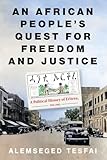An African People's Quest for Freedom and Justice : A Political History of Eritrea, 1941-1962 Tesfai, Alemseged / By Alemseged Tesfai
Publication details: London C. Hurst & Co. 2025Description: xxvii, 509 pages 24 cmISBN:- 9781911723790 (Hardback)
- 963.506
| Item type | Current library | Shelving location | Call number | Materials specified | Status | Notes | Barcode | |
|---|---|---|---|---|---|---|---|---|
 BOOKs
BOOKs
|
National Law School | New Arrival - Display Area | 963.506 TES (Browse shelf(Opens below)) | HB | Not For Loan | Recommended by Dr. Siddharth Narrain | 40395 |
Map -
Preface -
Acknowledgements -
Glossary -
List of Abbreviations -
List of illustrations -
Introduction -
Part One The British Period:
1. The British in Eritrea -
2. Political Rumblings in Eritrea, 1941–1945 -
3. Reforms, Interventions and Resistance -
4. Towards Party Formation in Eritrea -
5. Eritrean Political Parties -
6. The Four Power Commission of Inquiry -
7. The Eritrean Case at the UN General Assembly -
8. The Independence Bloc: Gains and Vulnerabilities -
9. The UN’s Final Verdict on Eritrea -
Part Two The Federal Years:
10. UN Resolution 390-A(V) -
11. The Eritrean Representative Assembly -
12. The Federation Inaugurated -
13. The Eritrean Government -
14. Revival and Suppression of the Workers’ Union -
15. The First Year of the Federation -
16. Assembly, Supreme Court and Federal Court Challenges -
17. The Fall of the Tedla Government -
Part Three The Road to the Eritrean Revolution:
18. Asfaha Weldemikael, Chief Executive -
19. The Weakening of the Legislature -
20. Political and Social Struggles at Home and Abroad -
21. Dismantling the Federal Base -
22. The Road to the Eritrean Revolution -
23. The Eritrean Liberation Front -
24. Eritrea on the Eve of Annexation -
25. The Annexation -
Epilogue: A Note on the History of the Armed Struggle for Independence -
Notes -
Primary Sources -
Bibliography -
Index.
Like its African neighbors, Eritrea attained colonial statehood under a European power, in this case Italy. Yet, during decolonization, its people were singularly excluded from the right to self-determination, for external reasons: superpower rivalry over the country's strategic position on the Red Sea; a mistaken notion of irreconcilable sectarian differences within Eritrea's population, invoked in order to brand it a society unfit for statehood; and Ethiopia's imperial claim, based on mythical historical connections.The Ethiopian call for Eritrea's return, supported by the UK and the US, sealed its fate at the international level. First, in the early 1950s, the UN General Assembly federated Eritrea as an autonomous unit under Ethiopian sovereignty; a decade later, Addis Ababa annexed it as a province--in neither case was the population consulted, sparking a liberation war.This vital book traces the genesis of the Eritrean independence struggle through hitherto unexplored local sources, both written and oral, analyzed against the rather scanty existing literature on this period. Alemseged Tesfai refocuses the narrative on the actions, reactions and expectations of a relatively small nation, in both size and population, as it set out to right an international wrong, imposed by the Great Powers of the day.
There are no comments on this title.
